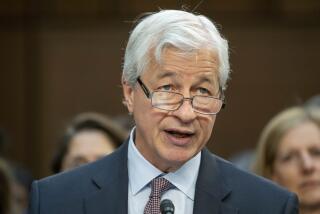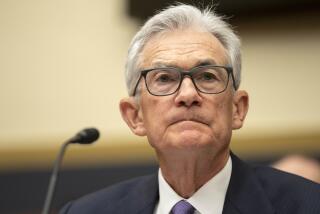Bernanke sharply warns Congress economy is ‘close to faltering’
Short on tools to fix the economy’s problems and under pressure from all sides, Federal Reserve Chairman Ben S. Bernanke let off some of his own steam — at lawmakers.
In an unusually sharp tone, the Fed chief chastised Congress during a hearing Tuesday for pushing the nation to the edge of default last summer, saying it’s “no way to run a railroad.”
He repeated calls for leaders in Washington, Europe and elsewhere to do more to help fix the global economy. And he pushed back against criticism that the Fed’s actions so far were fueling inflation.
When Rep. Mick Mulvaney (R-S.C.) suggested that the central bank’s low-interest-rate policies were encouraging excessive government borrowing, the mild-mannered Bernanke fired back:
“I don’t think that’s a valid point,” and added tartly: “We keep interest rates down somewhat. I don’t think that eliminates the responsibility of Congress to take its own action.”
In two hours before Congress’ Joint Economic Committee, Bernanke painted a gloomy picture of the economy, describing it as “close to faltering.” He predicted there would be no quick pickup in new jobs and again urged lawmakers to come up with a credible plan to deal with federal deficits.
His frustrations emerged more sharply and vividly than in the past. He empathized with anti-Wall Street protesters who, in marches in New York, Los Angeles, Chicago and elsewhere, have been blaming big financial institutions, including the Fed, for the economy’s woes.
“Very generally, I think people are quite unhappy with the state of the economy and what’s happening,” he said. “They blame, with some justification, the problems in the financial sector for getting us into this mess and they’re dissatisfied with the policy response here in Washington.
“On some level I can’t blame them,” he said. “Like everyone else, I’m dissatisfied with what the economy is doing right now.”
If Bernanke seemed particularly defensive, he has good reason.
Within the Fed, some policymakers who are worried about inflation are giving him flak about his low-interest-rate approach. Lawmakers of both parties are threatening to curtail the Fed’s independence. And a leading Republican presidential candidate, Texas Gov. Rick Perry, accused him of something akin to treason.
“He’s being attacked on several fronts, and his own frustrations have shown through,” said longtime Fed watcher Diane Swonk, chief economist at Mesirow Financial in Chicago. “He’s got to look strong, that he can execute even though he has dissenters.”
In his congressional appearance, Bernanke noted that the European debt crisis has been “a significant source of stress in global financial markets.”
U.S. banks do not have a large direct exposure to debt from troubled nations such as Greece, Portugal and Ireland, he said, but a disorderly default by any country in the Euro zone would cause “a huge amount of financial volatility globally,” damaging the U.S. economy.
“So it’s a very, very serious risk if that there were to happen,” he said. “And that’s why it’s extremely important that the Europeans continue along the lines that they have been on, which is to try to address that situation.”
The debt crisis in Europe has helped fuel volatility in the financial markets, which in turn has reduced confidence in the economy from U.S. businesses and consumers, Bernanke said.
Bernanke warned members of Congress against cutting the federal budget too deeply, given the current economic stresses. He said lawmakers could provide plans for long-term deficit reductions without going overboard in reducing spending in the short term.
He declined to tell lawmakers how they should reduce the deficit, refusing to be drawn into the bitter partisan debate of spending cuts versus tax increases. Bernanke said it wasn’t up to him to decide what action Congress should take.
“I’m in favor of the law of arithmetic. I don’t care — spending cuts, tax increases — as long as it adds up and as long as the policies themselves make sense.”
Bernanke emphasized that the Fed can do only so much to boost the economy using monetary policy. Congressional and other government officials, along with the private sector, have to do the rest of the work.
“I have no concerns about the creativity of your colleagues in finding strategies to work on,” he told Rep. John Campbell (R-Irvine), who pressed him for recommendations to address the downtrodden real estate market.
Many Republicans have criticized the Fed for its actions to try to boost economic growth, arguing that they have been ineffective and are fueling inflation. Republican congressional leaders wrote to Bernanke and other members of the central bank last month warning against “further extraordinary intervention” in the economy.
Despite the warnings, Bernanke and the Fed last month moved ahead with a new $400-billion strategy to sell some short-term Treasury bonds in its portfolio and buy longer-term bonds, a plan aimed at reducing long-term interest rates.
Three of the 10 members of the Fed’s policymaking Open Market Committee voted against the move, known as Operation Twist.
More to Read
Start your day right
Sign up for Essential California for news, features and recommendations from the L.A. Times and beyond in your inbox six days a week.
You may occasionally receive promotional content from the Los Angeles Times.








